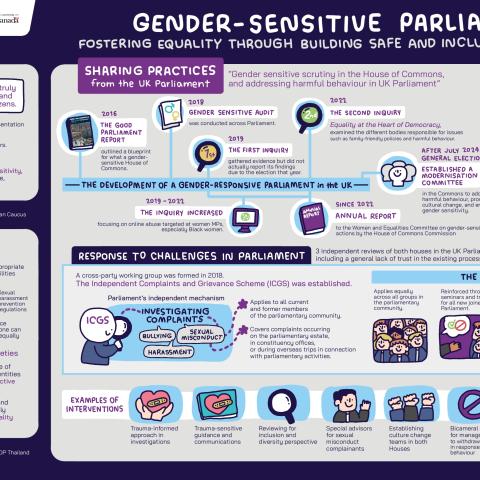The overarching argument of this paper is that parliamentary digital transformation is a relatively underfunded area of work, but a vitally important one in achieving the very common overarching goals of open, accountable, inclusive and participative government. Improvements in how parliamentary digital capacity building can be done better are possible with better strategy, funding and cooperation, and when parliaments are enthusiastic and willing to take the opportunities offered to them to improve themselves.
Now more than ever, digital transformation has become essential for parliaments. Such transformation can have a significant impact in making parliaments more transparent and accountable and can enable them to leverage greater public interest and engagement in the legislative and electoral processes.
Good external digital engagement requires parliaments to review their own internal digital structures, assess where development and investment are needed, and how digital improvement will assist in achieving their goals. Differential priorities in the needs of the parliament or societal actors can form a guide, according to which specific areas for digital development might be prioritised. These steps require long-term investment, which should go in parallel with the digital transformation of the Executive. However, because a country’s digital transformation is primarily the preserve of the Executive, it can bypass the legislature and may be almost disproportionately influenced by the ruling party. Uneven digital transformation between public bodies and the legislature may weaken the profile and legitimacy of the legislature itself. Furthermore, governments that effectively restrict digital development within the legislature are essentially restricting democratic integrity.
Besides the long-term process of building and developing infrastructure, short-term pilot projects can be useful to test approaches and begin building the digital infrastructure of the future. Properly targeted funding, to achieve specified digital transformation goals, agreed in collaboration with the development agencies operating in target areas, can yield significant dividends in improving the digital democracy ecosystem. This approach can neutralise harmful, short-termist and wasteful approaches to digital deficiency, and remove the ability of the more unscrupulous parliaments to play development agencies off against each other to leverage greater rewards or resources.
Digital transformation of parliaments requires better strategy, funding and cooperation on the part of donors and implementers as parliaments are enthusiastic and willing to take the opportunities offered by digitalisation.
Header photo: Jessica Taylor / UK Parliament
What's it all about?
Report authors Julia Keutgen and Rebecca Rumbol discuss their report and its key arguments

In what was dubbed the world’s largest single-day elections, Indonesia made history by conducting both presidential and legislative elections on the same day in February 2024. Over 204.8 million eligible voters were called to cast their votes at more than 823,000 polling stations.
A total of 3,676 women competed in the legislative elections, running for the 580 seats in the House of Representatives (DPR RI). In a pool of 9,917 overall legislative candidates, these women had to navigate a complex environment that, as confirmed by our investigation, remains vulnerable to violence against women in politics (VAWP).
As part of our ASEAN Women’s Political Leadership (WPL) programme, supported by Global Affairs Canada (GAC), WFD partnered with the Women Research Institute (WRI) to better understand the experience of women legislative candidates in the monumental 2024 elections.

The relationship between money and politics has been a pivotal issue in the Maldives, particularly since the adoption of a multi-party-political system in 2008. With elections serving as the cornerstone of representative democracy, the financial demands placed on candidates and political parties have grown exponentially, shaping the nature of political competition and governance and influencing electoral strategies, voter engagement, and, ultimately, political outcomes.
Recent parliamentary elections in the Maldives have also often been shaped by the presidential elections that precede them. With shifts in political power having a cascading effect on parliamentary races by influencing party finances, shaping alliances, and impacting voter behaviour. Money too is increasingly important in determining electoral outcomes, as parties and candidates vie to consolidate influence and secure majorities.
Although election success in the Maldives is not guaranteed by financial expenditure alone, few candidates can effectively compete without significant personal spending, support from external groups, or leveraging established family ties in politics. The heavy financial burden of political campaigns, coupled with a campaign culture that often prioritises personal and individual interests over policy discussions, risks undermining principles of accountability, inclusivity, and fair representation.
This report aims to explore the key drivers and patterns of political expenditure in the Maldives, examining costs incurred not only during campaign periods but also in the lead-up to and aftermath of elections. It seeks to analyse the economic dynamics and assess the broader implications of these financial pressures on Maldivian democracy by presenting findings that provide insights into electoral incentives, barriers to entry, and the financial sustainability of political engagement, along with recommendations which can contribute to reduced influence of money in Maldivian politics.

Women politicians from ASEAN and beyond took part in a peer-to-peer learning session to discuss how to advance gender-sensitive parliaments to support women’s participation and enhance their effectiveness as legislators.
They focused on creating safe and welcoming workplaces, supporting women in parliament, and helping women be effective lawmakers.
Experts from the UK, Australia, Indonesia and Thailand shared their knowledge and experience.

The Political Party Transparency Index (PPTI) is a tool developed by the Westminster Foundation for Democracy (WFD) in North Macedonia, in collaboration with the Forum for Reasonable Policies (FRP). Drawing from international best practices and comparative experiences, the index evaluates the transparency of political parties in their public communication, financial practices, and the level of intra-party democracy. Designed as an annual assessment, the PPTI serves as both a benchmark and a roadmap, highlighting areas for improvement within political parties.
The 2024 survey covers eight political parties from North Macedonia: Alternativa, Alliance of Albanians (Zijadin Sela’s wing and Arben Taravari’s wing), Besa, VMRO-DPMNE, Democratic Union for Integration (DUI), Liberal Democratic Party (LDP), New Social Democratic Party (NSDP) and Social Democratic Union of Macedonia (SDSM). Additionally, two new political parties/movements, ZNAM and the Democratic Movement, participated in research and mentoring events organized by the WFD. However, due to the need for a longer-term approach in measuring certain indicators, their inclusion in this year’s evaluation was postponed.
The findings of the report show that both external and internal factors influence the performance of political parties. For instance, the results of the 2023/2024 parliamentary elections and some party restructuring, as well as divisions and factionalism within certain parties, have slowed progress or even led to the formation of new political entities. The extended transition period from old to new leadership has also played a role.
While the index measures each party's progress, it also fosters a sense of competition. The results highlight several parties that made significant strides in improving their operations, benefiting not only themselves but also the public. For the first time, this report includes a comparative analysis of individual party progress, emphasizing that the goal is not ranking, but measuring the individual progress of the respective political party. Notably, smaller parties often demonstrate greater flexibility and receptiveness to improve, while larger parties tend to be slower in embracing reforms. Furthermore, internal crises in larger parties tend to have a more significant impact, hindering intra-party democracy, while smaller parties are typically able to recover more swiftly.




